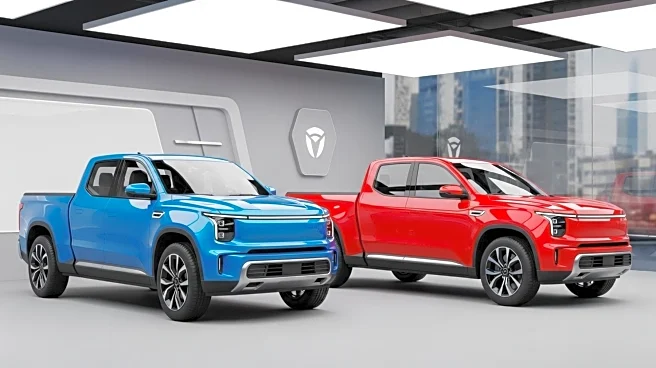What is the story about?
What's Happening?
The Philippine pickup truck market, traditionally dominated by diesel-powered models like the Toyota Hilux and Ford Ranger, is experiencing a significant shift with the introduction of electric pickups from Chinese manufacturers. BYD, Geely's Radar, and Dongfeng have launched electric models that are not merely experimental but are strategically positioned to challenge the existing market dynamics. Geely's Radar, in particular, has disrupted the market with its competitive pricing and modern electric vehicle architecture. The Radar RD6 Econ, built on Geely's Sustainable Experience Architecture, offers a car-like ride and handling, making it accessible to lifestyle buyers and early EV adopters. Meanwhile, BYD's Shark DMO targets the high-end market with its advanced hybrid system and premium features. Dongfeng's Rich 6 EV focuses on commercial utility, offering durability and a high payload capacity.
Why It's Important?
The entry of these Chinese electric pickups into the Philippine market signifies a broader trend towards electrification in the automotive industry. This development is crucial as it diversifies the market, offering consumers more choices and pushing traditional manufacturers to innovate. The competition among these brands is likely to accelerate the adoption of electric vehicles, contributing to sustainable mobility and reducing reliance on fossil fuels. For the U.S., this shift could influence global automotive trends, potentially impacting American automakers and their strategies in international markets. The increased competition may also lead to advancements in EV technology and infrastructure, benefiting consumers and the environment.
What's Next?
As the competition intensifies, other automakers are expected to enter the Philippine market, further diversifying the electric pickup segment. Industry insiders anticipate the arrival of new models from Zeekr and additional offerings from Dongfeng. This ongoing evolution will likely compel existing players to enhance their offerings, focusing on performance, affordability, and sustainability. The market dynamics could lead to strategic partnerships, investments in local manufacturing, and advancements in EV infrastructure. Stakeholders, including government agencies and environmental groups, may advocate for policies that support the growth of electric vehicles, promoting cleaner transportation solutions.
Beyond the Headlines
The shift towards electric pickups in the Philippines may have broader implications for the automotive industry, including ethical and environmental considerations. The transition to electric vehicles could reduce carbon emissions and promote sustainable practices. However, it also raises questions about the sourcing of materials for batteries and the environmental impact of manufacturing processes. Additionally, the cultural acceptance of electric vehicles in a market traditionally dominated by diesel trucks may require educational efforts and incentives to encourage adoption. Long-term, this trend could influence global automotive policies and consumer preferences, shaping the future of transportation.
















